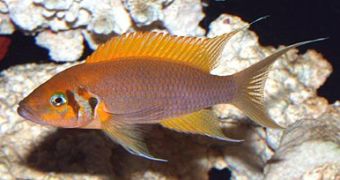Kissing a female bottom in order to ascend in the hierarchical rank is not specific only to some men. There are cases when testosterone (and its accompanying aggression) or kin degree may not help, but the help of the right female may, as found by a study on the social behavior of an African fish species and published in the journal "Proceedings of the Royal Society." With their tiny brains, fish make complex connections between social rank, reproductive physiology and group dynamics.
"We found that changes in social status were regulated by the most dominant female in a social group. In fact, dominant females seemed to act as gatekeepers, allowing only males larger than themselves to move up in status and become dominant," said lead researcher John Fitzpatrick, a graduate student in the department of Biology at McMaster University.
"Males rising to a dominant social position, instantly altered their behavior, becoming more aggressive. In addition, they dramatically ramped up their reproductive physiology, almost doubling the size of their testes in one week," said Fitzpatrick. The observations were made underwater, on the Zambian shores of Lake Tanganyika, on the cichlid fish species called Neolamprologus pulcher.
This fish lives in permanent social groups composed of a dominant male and female breeding pair and subordinate males and females acting like nurses that help the alpha pair to care for their offspring and defend the common territory. When the researchers removed the alpha males, they created an opportunity for lower ranked males to ascend on the social ladder.
"Hormones and genetic relationships didn't necessarily determine who gets to be top dog. Most folks would have thought that how aggressive you are, how big and powerful you are or how much testosterone you have might be important in understanding status change and dominance rankings. Our study combined several approaches to show that simply isn't the case - instead, the female and the social landscape are key," said senior author Sigal Balshine, an associate professor in the department of Psychology, Neuroscience & Behavior.

 14 DAY TRIAL //
14 DAY TRIAL // 
